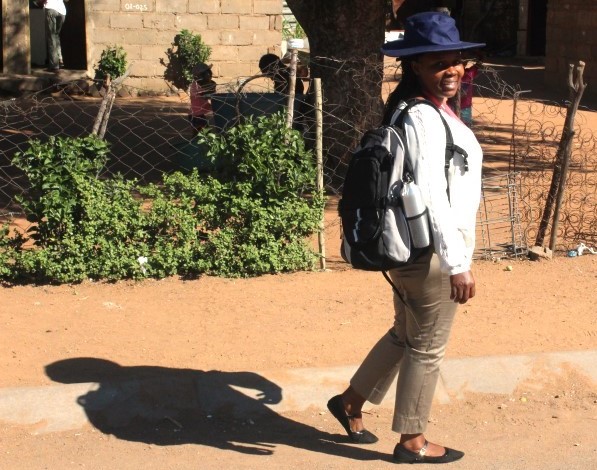
05 Mar Bringing the Meds Home: Botswana Debuts the Community Medication Refill Initiative
As part of its strategy, the U.S. President’s Emergency Plan for AIDS Relief (PEPFAR) approach for achieving epidemic control includes community-based antiretroviral therapy (ART) services—the provision of medicine to stable HIV patients outside of a health facility. In many countries, this approach has shown positive results in helping to keep patients on treatment. Although Botswana was the first country to offer free ART services to its population, until recently, stable patients were required to obtain their ART services at a health clinic, making it more likely that they would stop taking them. But this year, Botswana is making progress with the launch of a new community medication refill initiative in Old Naledi Clinic.
January 7, 2019 may well have been a normal day for many of the patients receiving antiretroviral treatment services at Old Naledi Clinic in Gaborone, but not for Kutlwano[1]. On this day, Kutlwano was not at Old Naledi. She was happily focusing on her daily activities and going to work rather than worrying about needing to go to the clinic to refill her antiretroviral medication (ARV). Kutlwano is enrolled in the community medication refill (CMR) initiative at Old Naledi Clinic. This initiative deploys community health workers and health education assistants to extend medication refills in the community. Just before the Christmas holidays, Kutlwano received a call from a community health worker who informed her that her next medication refill would be delivered to a place of her choosing, at a time convenient for her. In this instance, Kutlwano opted for her refill to be delivered to her workplace.
The CMR initiative’s systematic and client-focused delivery of pre-packaged ARV refills is the first of its kind in Botswana. It comes after the HRH2030 program, funded by USAID through the U.S. President’s Emergency Plan for AIDS Relief (PEPFAR), provided ten months of support to Greater Gaborone’s District Health Management Team (DHMT) to adapt and stimulate innovative service delivery through community-based HIV services. Working closely with other USAID-funded partners, including FHI360 through their Advancing Partners and Communities project, HRH2030 successfully facilitated an effective partnership for service delivery that links the facility with community-based service delivery partners. As a service delivery adaptation, CMR underscores the commitment of Botswana’s Ministry of Health and Wellness (MOHW) to “deliver differently” to improve health outcomes by addressing systems constraints like shortages in human resources for health.
As of January 2019, Old Naledi Clinic has more than 2,000 chronic patients currently accessing antiretroviral therapy (ART) services with a 46%[2] vacancy rate of health workers. CMR alleviates some of the burden felt by the health workers by decongesting the facility of routine, non-clinical visits. CMR also benefits patients by saving them time. Patients like Kutlwano can focus on having a productive day, instead of battling lines at an over-crowded, under-resourced health facility.
“The lines are long and often overwhelming, especially in the morning because they all come very early,” describes a nurse practitioner at Old Naledi. Some patients stand in line as early as 5 a.m. for their ART refills so they can arrive to work on time. While providing patients with more flexibility, CMR also facilitates regular and continuous administration of ART which not only keeps patients on treatment and virally-suppressed but may have positive psychosocial impacts as well.
PEPFAR has recognized Botswana as a country with the potential to achieve HIV/AIDS epidemic control by 2020. The CMR initiative is critical to the country’s prevention efforts. It revitalizes the facility-community linkage and empowers clients by reducing the frequency of their clinic visits. Overall, CMR sets an enabling environment for policy makers to consider differentiated service delivery models as efficient and cost-effective solutions for optimizing national health systems.
[1] The patient’s name has been changed to protect her privacy.
[2] Calculated only for nursing, doctor, and pharmacy technician positions (NB: There are currently no national staffing norms for clinics in Botswana, but a staffing criterion based on a facility’s level of use.)
Photo: A community health worker delivers pre-packaged antiretroviral medication as part of the community medication refill initiative in Gaborone.





